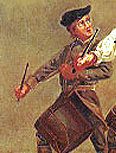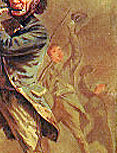|
|
|
July 13, 1999 CAUSES – LOST AND OTHERWISEIt has been said that "there are no lost causes because there are no gained causes." Whether this is true or not will not detain us here. Matthew Arnold called Oxford University "the home of lost causes," referring in particular, one assumes, to Oxford's support for the ill-fated Charles I during the Puritan Revolution. Richard M. Weaver – Tarheel, Professor of English, Southern Agrarian, and a genuine libertarian conservative – thought that all universities should be the home of lost causes. By this he meant that a broad understanding of the issues of the past is more genuinely useful to us than the bland Whig-historical assumption that whatever cause succeeded must have been right or somehow led to a better world. Obviously, he was wrong if he thought such an attitude possible in American universities, where social democratic Whig History reigns, threatened only by those to its Left. The phrase the "good old cause" is probably Jacobite in origin and, while the Jacobites certainly won the folk-song war, their cause – the restoration of the Stuart monarchy – did not fare very well. Below Messrs. Mason and Dixon's line, of course, we sometimes speak of our own "lost cause." There are even those who regret the defeat of Harold Godwin at Hastings in 1066. I reckon myself among them, although here, too, the Whig historians are quick to frighten us with scarecrows of evil things likely to have happened if the Normans had not arrived just in time. Tom Paine and Thomas Jefferson, to name two prominent libertarian/republican theorists, were not impressed with this reasoning and spoke often of the freedoms enjoyed by the Saxons before the Conquest imposed the Norman Yoke. Another lost cause is the Republican nomination of 1952, lost by Robert Taft, Mr. Republican, to the political novice and Establishment military hero, Dwight D. Eisenhower. The suspicion lingered long on the Right that this was somehow a put-up job and that Eisenhower's backers had stolen the nomination. In the Goldwater movement of my long bygone youth, we saw Goldwater's nomination as Taft's revenge. (All that the mass media saw was the delegates being "rude" to the leader of the Rockefeller wing of the party in the Cow Palace.) At that time, few of us understood the gulf between the philosophies of Taft and Goldwater. Karl Hess wrote a post-election book entitled In a Cause That Will Triumph (1967), but by the time the cause triumphed in the form of the Reagan-Bush non-revolution and Republican expansion of the bloated government they had promised to trim down, Hess had become an anarchist and, later, a writer for the Libertarian Party. So all this business of "causes" can be very tricky. Since I believe that there is a fundamental continuity in the struggle against intervention, dba the American Empire, from the Anti-Imperialist League of 1901 through the America First Committee and the movement against the War in Vietnam down to the present, I think it is far to soon to count the cause as lost. It is certainly not won, either. What we have to do with here is, I think, human history considered as a race between "state power and social power," as Frank Chodorov – seconded by the late Murray Rothbard – put it ("social" referring to actually existing, acting human beings and not to some reified entity fully known only to accredited witch-doctors like Emile Durkheim and Karl Marx). In this larger sense, the cause of social power – freedom, free markets, peace, and the rest – may not always "win" but neither should we pack up and go home. ROBERT TAFT AND REPUBLICAN MEMORYThis brings me back to Robert A. Taft, Senator for Ohio ("for" as well as "from" – check the Constitution). The media wizards of the day declared him "unelectable" as President, lacking the common touch, blah, blah, blah, and his loss to Eisenhower seemed proof to them that they were right. The ideas for which Taft spoke – those of the "isolationist," libertarian, and Republican Old Right – seemed discredited as well. And yet there is much in Taft's philosophy to steer today's venal, rudderless, and ideologically mushy Republicans along, if they had even the slightest interest in their own tradition. Taft came into the Senate in 1938 and rose to be a major spokesmen for the Republican Old Right. He was a constant critic of the New Deal's centralization, bureaucracy, administrative "law," and interference with markets. In foreign affairs, he stood squarely in the American non-interventionist tradition of Washington, Jefferson, and John Quincy Adams. This led him to condemn Roosevelt's covert drive to get into the European war and to assert the role of Congress in making foreign policy. He made light of the New Dealers' claim that we must go to war to protect our foreign markets, saying, "this country is almost self-sufficient.... a considerable part of our foreign trade will continue no matter who wins the war.... The whole foreign trade argument is a bogey-man...." The New Dealers' alarm over foreign markets stemmed from their commitment to what has been called Open Door (or informal) Empire and from their belief that American capitalism was somehow unsustainable at home without ever-increasing overseas trade. In 1945, Taft condemned Commerce Secretary Henry Wallace's program of foreign loans designed to promote American exports, branding it a new form of "dollar diplomacy." Taft's views survived World War II and shaped his response to the emerging Cold War. He tried to cut funding for the Marshall Plan and voted against the NATO pact in 1949. He asserted that NATO made war more likely, although he could never have imagined that NATO would begin a career of aggression after its alleged reason for existence had disappeared. When President Truman unilaterally and post-constitutionally took us into war in Korea, Taft condemned him and asserted the rights of Congress and the people. As for the political and media Establishment's theme of "bipartisanship" in foreign affairs, Taft called it "a dangerous fallacy." In debate over the President's supposedly inherent power to deploy troops overseas, Taft declared, "If the President has unlimited power to involve us in war, war is more likely." (I think this has been shown to be true once or twice since Taft spoke.) Taft was not perfect, but he towers above most of his Republican successors. (He waffled far too much with regard to Asian policy.) His views can be found in the Congressional Record and in published speeches and articles. They are most accessible in his little book, A Foreign Policy for Americans (1951). There Taft underscored his deeply held belief that a nation's foreign and domestic policies are inextricably entangled and that foreign policy does not exist in a separate box unconnected with American life. This sense of the unity of American policy led Taft to any number of conclusions which today's Republicans would find odd or irrelevant. After all, he began his book with the statement that "the ultimate purpose of our foreign policy must be to protect the liberty of the people of the United States." What? No "national purpose"? No concern for all the poor foreigners? No New World Order? No, just the liberty of the American people, not even their prosperity, psychological wellbeing, or their karma. He continued: "Only second to liberty is the maintenance of peace." Taft was deeply aware of the costs of war – in lives, in economic hardship, and in promoting the growth of an all-powerful state inimical to republican liberty. He pointed out that permanent military conscription – instituted by the Truman administration – is "the greatest limitation on individual freedom in peacetime the people have ever had imposed on them." Permanent mobilization would lead to bureaucratic inroads on American liberty that might prove irreversible. At the same time, the strain on the economy would bring about inflation and other distortions. Behind the world-saving program of the Democratic party and the "internationalist" Republicans, Taft saw a particular philosophy of life. As he put it: "There are good many Americans who talk about an American century in which America will dominate the world.... The trouble with those who advocate this policy is that they really do not confine themselves to moral leadership. They are inspired with the same kind of New Deal planned-control ideas abroad as recent Administrations have desired to enforce at home. In their hearts they want to force on these foreign peoples through the use of American money and even, perhaps, American arms the policies which moral leadership is able to advance only through the sound strength of its principles and the force of its persuasion." (Here Taft gives us here the key to the ideology favored at the Weekly Standard, the New Republic, and some other publications.) Taft's little book is long out of print. One sees it occasionally in used book stores. If anyone has a copy to spare, I suggest sending it to George Dubbya, Dan Quayle, and others who may be needing a refresher course in what an American foreign policy might look like. Joseph R. Stromberg has been writing for libertarian publications since 1973, including The Individualist, Reason, the Journal of Libertarian Studies, Libertarian Review, and the Agorist Quarterly, and is completing a set of essays on America's wars. He is a part-time lecturer in History at the college level. You can read his recent essay, "The Cold War," on the Ludwig von Mises Institute Website. His column, "The Old Cause," will appear each Tuesday on Antiwar.com Please Support Antiwar.comA contribution of $20 or more gets you a copy of Justin Raimondo's Into the Bosnian Quagmire: The Case Against US Intervention in the Balkans, a 60-page booklet packed with the kind of intellectual ammunition you need to fight the lies being put out by this administration and its allies in Congress. Send contributions to Antiwar.com or
Contribute Via our Secure Server |









